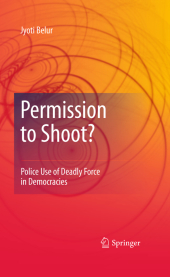 Neuerscheinungen 2014Stand: 2020-02-01 |
Schnellsuche
ISBN/Stichwort/Autor
|
Herderstraße 10
10625 Berlin
Tel.: 030 315 714 16
Fax 030 315 714 14
info@buchspektrum.de |

Jyoti Belur
Permission to Shoot?
Police Use of Deadly Force in Democracies
2010. 2014. xvii, 226 S. 235 mm
Verlag/Jahr: SPRINGER, BERLIN; SPRINGER NEW YORK; SPRINGER 2014
ISBN: 1-493-90234-2 (1493902342)
Neue ISBN: 978-1-493-90234-7 (9781493902347)
Preis und Lieferzeit: Bitte klicken
This book explores police abuse and extrajudicial killings in major countries, especially India and the U.S. It is based on primary-source interviews with police officers, those involved in the killings, those who facilitate them, and mute spectators.
Extrajudicial executions have blighted parts of the world for generations, but criminological coverage has been superficial and selective, in that it has concentrated on South America giving the impression that this is a problem specific to that part of the world and associated with military rule, dictatorial regimes and colonial heritage. Permission to Shoot?: Police Use of Deadly Force in Democracies brings a new dimension to the problem of police abuse of deadly force by concentrating on India and the United States, both large democracies and vibrant superpowers.
In the book, the research is based on primary sources-interviews with police officers of varying ranks: those who are involved in the killings; those who facilitate such operations; and those who are mute spectators. The book deals with universal, fundamental themes such as: what makes ordinary, decent human beings do horrible things? What motivational techniques and justifications are used to override social norms governing moral conduct, centring on the sector of society mandated to use deadly force against civilians? Why in a democratic country the abuse of police powers appears to be overtly and tacitly encouraged?
Permission to Shoot? seeks to provide broad guidelines and recommendations for reforms in policing policy and practice in developing countries. The research peels back the lies and deceit that surround this issue, but more than that it shows how those lies and deceit act to support the practice itself.
Police and the Use of Deadly Force.- A Tale of Three Cities.- Policing and Organised Crime in Mumbai.- Defining Encounters.- Are Encounters Effective? Police Role and Police Image.- A Culture of Complicity? Social Attitudes Towards Encounters.- Justifying Encounters: The Theory of Denial.- Explaining Encounters: What Can We Do About Them?.- Appendix: Methodology.


